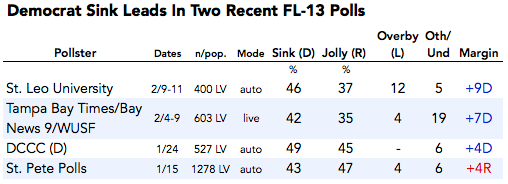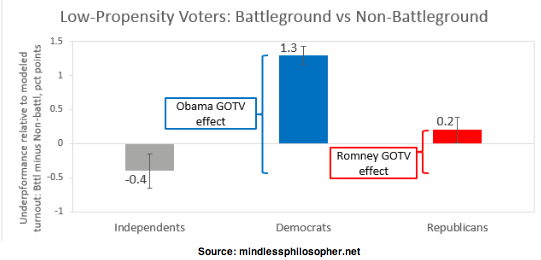
A report on early voting in the special election in Florida's 13th District suggests no turnout advantage for the Republicans. We take a closer look at the race. A Democratic data scientist quantifies Obamas get-out-the-vote advantage over Romney. And it's still not 2016 yet. This is HuffPollster for Friday, February 21, 2014.
THE FLORIDA 13 SPECIAL ELECTION - On March 11, Florida will hold a special election in the state's 13th Congressional District to choose a successor to the late Rep. C.W. Bill Young (R), who died in October. Two polls conducted in early February give Democrat Alex Sink a narrow lead against Republican David Jolly.
Today's News - Adam Smith reports that 64,000 absentee ballots have been cast in the race so far (ballots were sent out on February 7): "Of those, 42 percent came from Republicans and 39 percent from Democrats, so you might think this is good news for Republican nominee David Jolly. Wrong. Democrats and Republicans alike have predicted Republicans would have a significant turnout advantage in Congressional District 13, probably by at least seven percentage points.That Republicans have only a three point advantage at this point has to be troubling for Jolly. Consider that in 2012, Republicans turned in nearly six percent more absentee ballot votes than Democrats in the district. That was a presidential year where the Obama machine had a huge get-out-the-Democratic vote effort. Jolly allies think 2010 is a more comparable year, but if so Republicans should be even more worried by the early vote so far...In 2010 (the district lines were slightly but not significantly different), Republicans accounted for 46.4 percent of the nearly 112,000 absentee votes cast and Democrats 35.4 percent." Note: According to statistics published by Florida's Department of State, 37.5 percent of the District's 468,704 voters are registered as Republicans and 35.2 percent as Democrats. [Tampa Bay Times, Florida Dept. of State]
Background - Rep. Young’s passing in October set off a flurry of activity among the two parties to capture what the Cook Political report calls "an evenly split district": President Obama won the district by a single point in 2012, and since 2000, the presidential contests in the district have been decided by margins of 2 percentage points or less. The Democratic nominee is former Florida Chief Financial Officer Alex Sink (D), who was also the 2010 Democratic nominee for governor. The GOP nominee is David Jolly (R), a former aide to Rep. Young. The Tampa Bay Times reported in early February that outside groups were spending more than $4 million "to support and trash" Sink and Jolly: "More than $2.6 million has been spent on television ads for Sink, including $1.9 million from the Democratic Congressional Campaign Committee. Jolly supporters have shelled out $1.6 million, including more than $700,000 from the National Republican Congressional Committee. This outside spending far outstrips television buys by the candidates' own campaigns." [Tampa Bay Times; see also Cook Poltical, NYTimes, Politico]
Polling - Two surveys conducted in early February showed Sink leading. A Tampa Bay Times/Bay News 9/WUSF Public Media poll that used live interviewers to call landline and mobile phones from February 4 to 9 had Sink ahead of Jolly 42 to 35 percent, with 4 percent for Libertarian candidate Lucas Overby. An automated poll conducted by St. Leo University (that used an automated, recorded voice methodology to call landlines and an online internet panel to reach cell-only households) found Sink leading Jolly 46 to 37 percent, with 12 percent for Overby. [Tampa Bay Times, SaintLeo, Pollster compilation]
Handicapping - House race handicappers, who closely follow the campaigns, are a bit more guarded in their assessments of this race. Both the Cook and Rothenberg political reports continue to rate the race as a "toss-up." Sabato's Crystal Ball shifted its rating to "leans Democratic" in January, characterizing the race as "Sink's to lose." [Cook, Rothenberg, Sabato]
What will it mean for 2014? - Not much, argues Jon Bernstein: "Special elections simply don’t predict very much about the upcoming election cycle results. At least one [academic research] paper hints that takeovers by one party in multiple special elections mean something, but with only one election, we’re talking about a very, very, weak signal at best. [Bloomberg]
HuffPost's Stephen Calabria provided reporting
DID OBAMA'S GOTV EFFORTS DESERVE THEIR HYPE? - Aaron Strauss: "In the immediate aftermath of the 2012 presidential election, some academics were skeptical that the Obama campaign deserved so much post-election media hype….Here’s what I found: The Obama campaign was indeed more effective than the Romney campaign at turning out their supporters. This effect is clearest among those who were not highly likely voters to begin with — who are exactly the voters that a GOTV campaign would target…. Among those whose turnout probability was below the median likelihood, independents (whom neither campaign targeted) were actually slightly less likely to turn out in battleground states than non-battleground states. By contrast, Obama campaign’s mobilization tactics increased turnout among targeted Democrats by about 1.7 percentage points, relative to independents. The Romney campaign was also effective, but less so: their supporters were about 0.6 percentage points more likely to turn out than non-targeted independents….What does this mean for vote margins? To take the closest battleground state in 2012—Florida—I estimate that targeted GOTV efforts by Obama netted an additional 42,000 votes, while Romney’s efforts turned out an additional 7,000 votes, for a difference of 35,000 Obama votes. Those extra votes account for about half of Obama’s winning margin in Florida." [The Monkey Cage; see also Mindless Philosopher]
-Political scientist Alan Abramowitz has doubts: "Why I am skeptical of claim that Obama GOTV effort affected election results: my analysis shows no effect of turnout or swing state status...Controlling for Obama 2008 vote share, Obama did no better in higher turnout states or swing states in 2012." Replying to Strauss: "But this is a very small effect on a fairly small group that is hard to see in the overall election results." [@AlanIAbramowitz via Storify]
-Strauss responds: "disagree. Analysis is across all battl[eground] states. Effect is plenty big to make the diff in v close elections." [@aaron_strauss]
NYHAN: IGNORE THOSE POLLS - Political scientist Brendan Nyhan posts another in his regular reminders about early 2016 trial-heat poll questions: "In their book The Timeline of Presidential Elections, the political scientists Christopher Wlezien and Robert Erikson find that polls conducted even 300 days before an election have virtually no predictive power; their forecasting power comes later in a campaign...Just as a reminder: We are currently 990 days away from the 2016 election....As a general rule, candidates with high name recognition and favorable public profiles often appear formidable in these early polls, but campaigns serve to remind people of the state of the country and their partisan loyalties. As a result, candidate quality matters less than most journalists assume...and the economic fundamentals—which can’t be known at this early date—matter much more. And while trial heats may have some limited value as a snapshot of a candidate’s standing with the public, simple polling statistics like a politician’s favorable/unfavorable numbers are easier to interpret and comparable with a longer time series of historical data." [CJR]
HuffPollster adds: The early 2016 polls do come with a hidden benefit. They allow for two years' worth of articles about the lack of predictive power of early 2016 polls.
HUFFPOLLSTER VIA EMAIL! - You can receive this daily update every weekday via email! Just enter your email address in the box on the upper right corner of this page, and click "sign up." That's all there is to it (and you can unsubscribe anytime).
FRIDAY'S 'OUTLIERS' - Links to the best of news at the intersection of polling, politics and political data:
-PPP (D) finds Kansas Gov. Sam Brownback (R) trailing his challengers. [PPP]
-Hillary Clinton maintains a positive image in the U.S. [Gallup]
-Fewer Americans than in almost two years say the U.S. economy is worsening. [Bloomberg]
-Brendan Nyhan reminds us, yet again, of the poor predictive value of early 2016 trial heat polls. [CJR]
-SurveyUSA polls the nation and nine states on the Keystone XL for NextGenClimate Action. [SurveyUSA]
-Investors bet Obamacare will remain remaining in force. [Businessweek via WonkWire]
-Some Republicans are bemoaning a talent gap between their party and the Democrats. [National Journal]
-Charlie Cook explains why money is a poor predictor of election outcomes. [National Journal]
-A Democratic-sponsored poll gives Jeanne Shaheen a lead over Scott Brown in New Hampshire. [WMUR]
-Frank Luntz (R) named "communications analyst" for Fox Sports 1. [Futon Critic]
-26 percent of Americans are fans of mixed martial arts fighting. [PublicMind]

